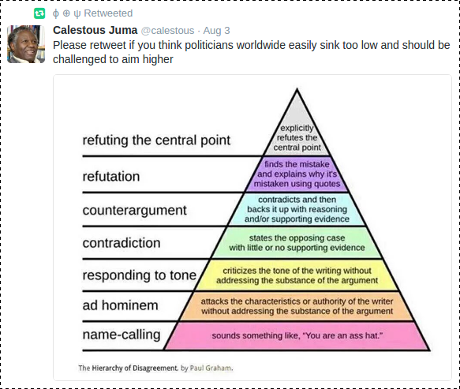Politicians? Politicians?
Hell, I would be happy if news commentators and “experts” that appear on news shows would rise above contradiction.
Repetition, especially repeating what other commentators have said, isn’t evidence, it’s just noise.
If the medium you are using doesn’t support robust referencing of facts and analysis, you are using the wrong medium.
Or should that be … “you are following the wrong medium?”
You remember the Dilbert cartoon about the evening news, Sunday February 07, 1993 with the line:
A new poll shows that many voters have strong opinions on these issues despite the fact that we provide no useful contextual data.
That is a great summary of news reporting on top issues of the day. On occasion NPR will have an in-depth analysis but it repeats the stories of the day with little context, just like other media outlets.
Granting that is a limitation of the medium, why not use the Internet to deliver the context that video or radio media lack the time to deliver? Using video or radio as a highlights or awareness service, with further details collected and organized for viewer/listeners.
Despite timely, accurate and moving news reporting, I don’t have a regular source that provides in-depth contextual for everyday news stories.
For example, the internet was aflame with news of Trump asking “…why he could not use nuclear weapons?” Or at least that was the headline.
Some reports did pick up the contradiction in spending $billions on weapons you aren’t (don’t intend?) using, but few and far in between. And of those that did, how many examined the economic drivers that have created a useless product industry? The one that produces nuclear weapons.
In case you are curious, the United States has steadfastly refused to renounce first strike as a military strategy. (Report on Nuclear Employment Strategy of the United States, 2010, yes, during President Obama’s first term in office).
Do you recall seeing in depth reporting or analysis of either of those two aspects of the use of nuclear arms issue?
There was a lot of huffing, puffing and strutting around as I recall but little in the way of substantive or contextual analysis.
